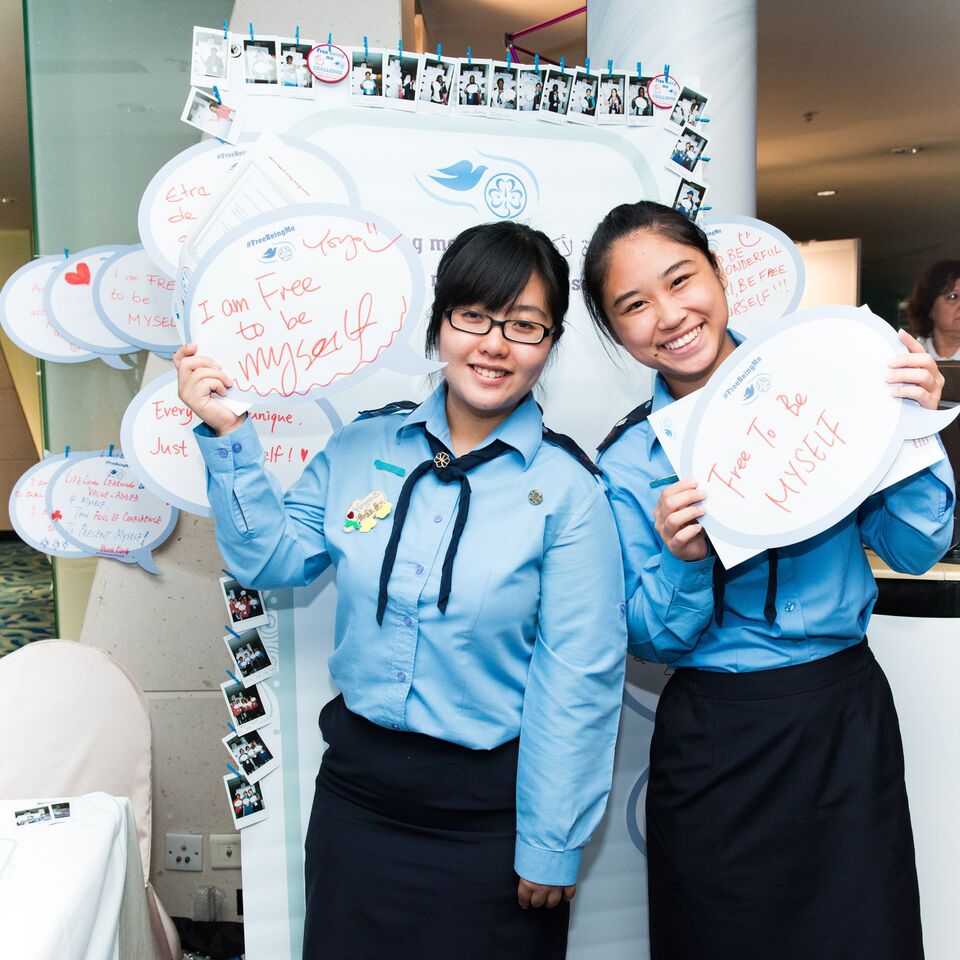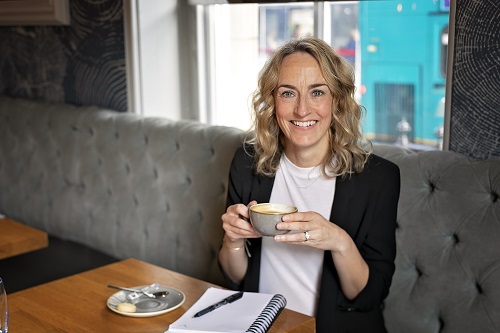I have a 6-year-old daughter. Yes, she is only little but I’ve started to wonder how she will feel about her body as she grows up. As she navigates those early teenage years, will her body confidence be high?
Today, as she put on her school uniform, she hiked her skirt up so that it was about 3 inches from her bottom. She didn’t realise it but it looked rather silly. I asked her why she was doing this and she said, ‘to be like the other girls.’ Peer-pressure at 6.
I think it’s harder than ever today to love your body as it is. And that goes for both women and girls (actually, men and boys too). It’s tough to like your body if all you see are images of women whose bodies look completely different to your own.
WAGGGS and Dove Join Forces – Free Being Me
 As a mum, I did wonder how I could help and encourage my daughter to like her body, no matter what her shape or size. After a few searches online, I stumbled across the Free Being Me website (www.free-being-me.com).
As a mum, I did wonder how I could help and encourage my daughter to like her body, no matter what her shape or size. After a few searches online, I stumbled across the Free Being Me website (www.free-being-me.com).
Free Being Me is a partnership between the Dove Self-Esteem Project and WAGGGS (World Association of Girl Guides and Girl Scouts).
I contacted Jenny Giangrande, Global Programme Manager at WAGGGS, to find out some more.
Who Are WAGGGS?
Firstly, she explained a bit more about WAGGGS. I was a Girl Guide myself, many moons ago, however I didn’t realise that WAGGGS is the largest voluntary movement dedicated to girls and young women – in the world.
WAGGGS represents ten million girls and young women from 146 countries. It helps to support and empower them to achieve their fullest potential and to become responsible citizens of the world.
Jenny explained that, ‘we create programmes that we feel are globally relevant, such as Free Being Me.’ When you hear the words ‘globally relevant’, you realise that the issue of low body esteem is affecting girls all over the world, not just in here in the UK.
The Impact Of Low Body Esteem
We talked about the impact of low body esteem and Jenny referenced some of the research that Dove had done.
We chatted about some of the activities that girls can avoid or miss out on because they are worried about how they look – such as putting their hand up in class, going to the doctors, going to the beach with their friends.
I wanted to share with you, as well, a couple of findings from The Dove Global Beauty and Confidence Report below – the research was carried out across 13 countries:
8 out of 10 girls with low body-esteem have avoided fundamental development activities such as spending time with family and friends, joining a team or club or participating in activities outside the house.
By the time girls reach late childhood, their life satisfaction and overall happiness starts to fall steeply – and never recovers.
What is the Image Myth?
Behind Free Being Me is the concept of the ‘Image Myth’, which is the idea that there is a ‘perfect’ way to look that we should all work hard to achieve.
The girls are taught how to challenge the Image Myth. Different activities are used from writing letters to friends, to watching videos, brainstorming in groups, doing sketches etc.
Jenny went on to say that there are 2 main messages.
- The Image Myth doesn’t make sense and doesn’t exist.
- There are a lot of costs associated with it – from the monetary costs of buying beauty products to the emotional costs such as not wanting to do sports, jealousy amongst friends, not having fun at parties.
It gets them to open their eyes to the Image Myth, to challenge it, to disagree with it, to encourage them to feel free to be themselves and to support their friends to be themselves too.
They talk about what society is telling them about how a girl should look – that it’s a long list and one that no-one can achieve.
One of my favourite exercises that the Girl Guides do is to pretend to set up a magazine that helps girls feel good about the way they look. In a previous session they decided to leave the fictional Gloss magazine as it encouraged people to follow the Image Myth. They get to choose what picture they would put on the front cover of the magazine and what headlines stories they would write.
So far, the programme has reached over 3,690,000 girls around the world and is now in 19 languages. Amazing!
Hearing Other People’s Stories
Jenny also put me in contact with a couple of girls who were heavily involved in the Free Being Me programme. Here’s what they had to say:
Laura West, vice-chair of the Europe Region for WAGGGS. ‘All around me I see young girls and women hiding in their shadow, wanting to have another body and shying away from who they truly are. The fight for body confidence and self-esteem is far from over; we must do more to free society from the grip low body confidence has on us.’
Olivia Hardacre, was part of the WAGGGS delegation to the UN Commission on the Status of Women in March 2016. Part of her case study is below:
Our WAGGGS panel were all able to bring different perspectives of the programme to the room. Audience members seemed particularly excited that we had so many young women on the panel!
We encouraged the audience to participate in a few Free Being Me activities including defining the Image Myth and Body Talk scenarios and it was brilliant to see a room of adults getting really into what they were doing.
We heard from Paula from Germany, and the difference that thinking about Body Talk has made to her and her friends’ self-esteem. Haifa from WAGGGS’s World Board and Stacie from Dove both spoke about the facts behind the programme and the emerging data we have about the impact so far.
It was exciting to hear that Free Being Me really means that girls are less likely to put up with Body Talk, or allow how they feel about their appearance to stop them doing anything.
Want To Learn More?
If you’re interested in learning more about this amazing programme, please go to the Free Being Me website (www.free-being-me.com) and the WAGGGS website (www.wagggs.org) . On Twitter, follow #FreeBeingMe and follow @wagggs_world.
Thanks
Lou









Hi Lou,
It’s great that more people are finding out about the Free Being Me programme, thanks for writing about it. I work at the Centre for Appearance Research in Bristol and have worked on the team evaluating Free Being Me, led by Associate Professor Phillippa Diedrichs.
Last year, we did a short podcast episode on Body Image Interventions featuring Jenny from WAGGGS as well as Dr Eric Stice (Free Being Me is based on a programme he developed for college-aged girls, which has been rigorously tested and found effective).
You (and your readers) can listen to the episode here:
https://itunes.apple.com/gb/podcast/episode-6-body-image-interventions/id1069856498?i=1000367973330&mt=2
BW,
Nadia
Hi Nadia – thank you for sharing this. I will take a look. I did speak to Dr Diedrichs last year when I was doing some research into body confidence. Aware of the great work you do at the Centre and would love to share more on my blog.
Best regards,
Lou